The Unique Intelligence of ENFPs, ENTPs, INFPs and INTPs
Have you ever wondered if certain personality types are smarter than others? While I’m pretty strongly against “type-ism” or praising one type over another, there are certain types of intelligence that each type brings to the table. We’re going to start by talking about the extraverted intuitive personality types, or NPs for short. All four of these types value a mental process called Extraverted Intuition. Types who use this brand of intuition have a unique way of learning and gathering information. We’re going to take a closer look at what that is!
Not sure what your personality type is? Take our new personality questionnaire here. Or you can take the official MBTI® here.
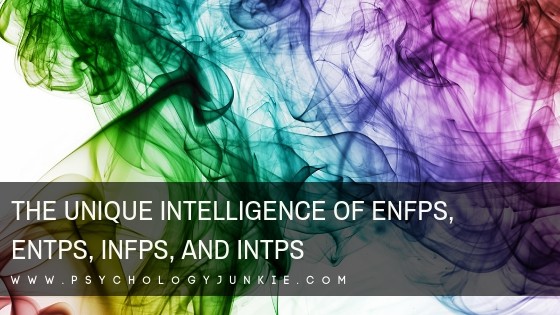
Table of contents
- What is Extraverted Intuition?
- Which Personality Types Use Extraverted Intuition?
- Extraverted Intuitive Intelligence
- ENTP and INTP Learning
- ENFP and INFP Learning
- How Well Do ENFPs, ENTPs, INFPs, and INTPs Perform in School?
- A Breakdown of the Intelligence Style of Each NP Personality Type:
- Other Articles You Might Enjoy:
Estimated reading time: 8 minutes
What is Extraverted Intuition?
Extraverted intuition, or “Ne” for short, is an information-gathering process that sees abstract connections, possibilities, and potential in the outside world. Ne-users love to discuss theories, concepts, and hypothetical scenarios. For example, a Ne-user might see the moon and think to themselves, “what would happen if the moon exploded tomorrow?”. They might veer into many related scenarios having to do with the moon. This sounds quirky, but Ne has many practical uses as well. A Ne-user could find a way to improve an existing form of technology and make it better than it ever was! Or in an everyday sense, a Ne-user could be dealing with a stressful situation (a crying child, running late for work) and find many different creative solutions to dealing with that problem.
Which Personality Types Use Extraverted Intuition?
Extraverted Intuition is the dominant function of the ENFP and the ENTP. It is the auxiliary function of the INFP and the INTP. ESFJs and ESTJs have tertiary extraverted intuition, and ISFJs and ISTJs have inferior extraverted intuition.
Extraverted Intuitive Intelligence
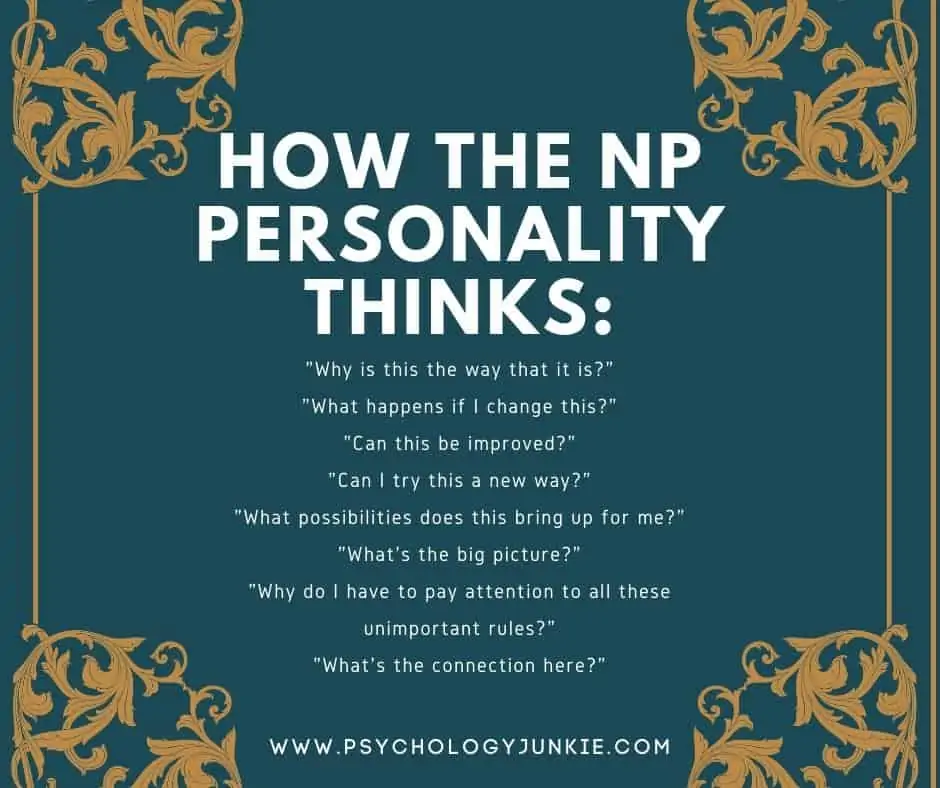
Types who value extraverted intuition are gifted with innovative creativity. They are good at being flexible, adjusting to new incoming information, and thinking outside of the box. They are described as “holistic learners” which means that they like contemplating and focusing on abstract concepts and big-picture ideas rather than concrete data and facts. This is why an NP student might handle creative writing very well, but might struggle if given a history test where they had to remember all the provinces in Canada (unless they had a personal interest in Canada). NP types are going to have an easier time remembering concepts and theories over facts and concrete data. This is especially true for ENFPs and INFPs. ENTPs and INTPs enjoy collecting raw data to see how it relates to everything else they know.
ENFPs and ENTPs like a collaborative, active learning experience. They learn well when they can bounce ideas off of other people and embark on innovative team projects. According to “Introduction to Type and Learning”, they enjoyed learning in a “noisy, active” atmosphere. INFPs and INTPs like a little more independence and personal space when they study, but they still share a lot of the same learning tendencies as ENP types.
All NP types want to experiment, create, innovate, and explore. Most significantly, they always need to do things in new ways. The biggest frustration sensing teachers have with NP students is dealing with their desire to change everything up, question, and try to find new, better, and sometimes rule-breaking ways to complete assignments. NP students are typically unconventional, random, creative, and experimental. They like challenging themselves, but they don’t like following rules, having constraints, or having to do things “by the book”. Forcing an NP child to complete a project with very strict and rigid constraints and specifications takes all the fun out of it for them. It makes them feel like they’re not really learning; they’re just replicating something that has already been done a thousand times before.
ENTP and INTP Learning
ENTPs and INTPs use a mental process called Introverted Thinking (Ti) alongside Extraverted Intuition (Ne). They like to apply abstract information to fit situations and categories. They enjoy experimenting, hypothesizing, inventing, and working with interrelated threads of ideas. They are skilled in the art of strategy and are quick to notice patterns that develop and change over time. They have a gift for noticing inconsistencies, errors, logical loopholes, and inaccuracies. This can make them appear critical sometimes, but it’s simply how they are wired. They innately notice what “doesn’t fit”.
ENTPs and INTPs learn best when the subject matter is conceptual and there is a clear objective. They like having a large and intriguing body of knowledge to immerse themselves in and master. They want to be able to ask plenty of questions and pose theoretical challenges and debates. They are turned off by memorization and repetition and they prefer a loose structure without a strict schedule or agenda.
Overall, ENTPs and INTPs have a gift for inferring relationships, noticing threads of meaning, and looking around their environment to see potential and possibility. They ask themselves questions like, “What hypotheses can be created from this?” or “How can we transform this?” They are also skilled at analyzing, categorizing, and figuring out how things work. They have a knack for figuring out how systems are created and maintained and how all the pieces of information fit together.
ENFP and INFP Learning
ENFPs and INFPs use a mental process called Introverted Feeling (Fi) alongside Extraverted Intuition (Ne). They want to promote growth and focus on ideas, causes, and values. They have a gift for understanding multiple meanings behind words, especially words that are left unsaid. This makes them skilled at detecting phoniness or hidden agendas. They often pick up on other people’s feelings and their sense of ethics – especially things like hypocrisy. These types gain a lot of pleasure from imagining and weaving stories and possibilities together in many different ways.
ENFPs and INFPs learn best when they can see the greater significance of what they are learning and how it applies to the big picture. They enjoy getting insight into the deeper issues and meanings behind people and their psychology and values. They need to have a meaningful purpose or goal in order to feel motivated. They hate anything superficial or shallow. A loose structure with plenty of room for self-discovery is usually what inspires the best learning for them.
Overall, ENFPs and INFPs have a gift for inferring relationships, noticing different relationships and webs of meaning, and scanning for possibilities. They are also good at evaluating what’s important, authentic, and meaningful. They have a skill for detecting hypocrisy and hidden agendas. They are also good at inspiring people to meet their potential.
How Well Do ENFPs, ENTPs, INFPs, and INTPs Perform in School?
Statistically, NP types have lower-than-average grades, but higher-than-average IQs (MBTI® Manual – Third Edition, page 269), This is largely because statistically most classrooms are taught by Judging teachers and appeal to Judging students. The methodical, steady-as-you-go approach that most Judging students (especially Sensing-Judging students) have tends to result in more organized, on-time work and thus higher grades. Since points are deducted for late work or not completing the project “as stated” many NP types end up with lower grades simply because they don’t conform to the standard expectations of most classrooms or they might get penalized for innovating.
It’s my personal opinion that many NP students would get higher grades if classrooms could be structured to appeal to both perceiving and judging personality types.
A Breakdown of the Intelligence Style of Each NP Personality Type:
ENFP Intelligence:
– Innovative
– Creative
– Collaborative
– Goal-oriented
– Connected
– Abstract
– Active
– Random
– Holistic
– Right-hemisphere
– Experimental
– Conceptual
– Field independent
– Post-conventional
– Diplomatic
ENTP Intelligence:
– Innovative
– Creative
– Collaborative
– Abstract
– Active
– Goal-Oriented
– Experimental
– Random
– Conceptual
– Participant
– Post-conventional
– Field independent
– Connected
– Holistic
– Strategic
INFP Intelligence:
– Reflective
– Observational
– Abstract
– Post-conventional
– Random
– Experiential
– Holistic
– Right hemisphere
– Connected
– Random
– Innovative
– Conceptual
– Goal-oriented
– Self-directed
– Diplomatic
INTP Intelligence:
– Reflective
– Observational
– Abstract
– Post-conventional
– Random
– High in fact retention
– Systematic decision-maker
– Goal-oriented
– Conceptual
– Self-directed
– Innovative
– Holistic
– Experimental
– Strategic
What are Your Thoughts?
Have you enjoyed this article? Do you have any experiences or wisdom you’d like to share? Let us know in the comments!
Find out more about your personality type in our eBooks, Discovering You: Unlocking the Power of Personality Type, The INFJ – Understanding the Mystic, The INFP – Understanding the Dreamer, and The INTJ – Understanding the Strategist. You can also connect with me via Facebook, Instagram, or Twitter!
Other Articles You Might Enjoy:
Here’s Why INFPs and INTPs Get Misunderstood
Here’s What You Hated About School, Based On Your Personality Type
3 Weird and Wonderful Secrets About the ENFP




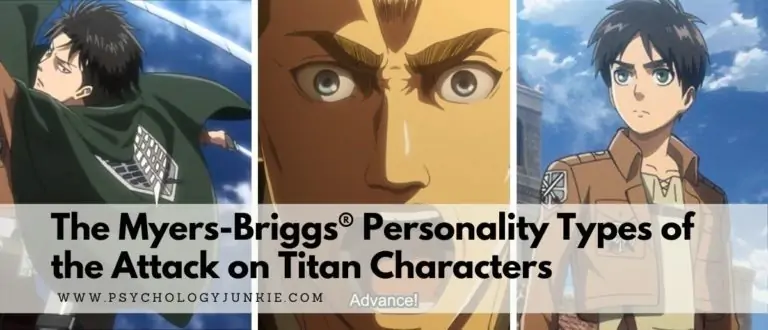
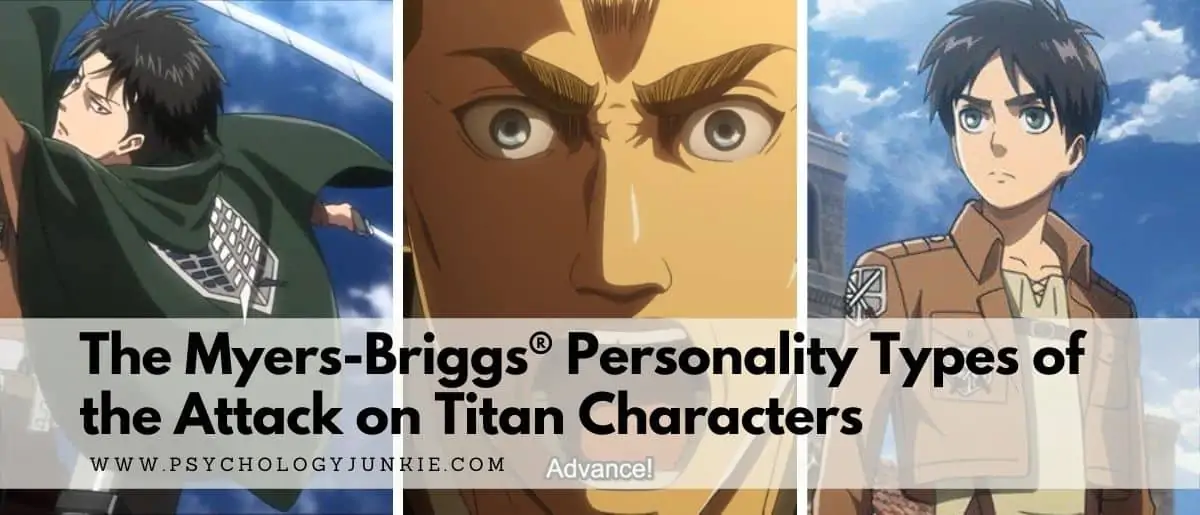



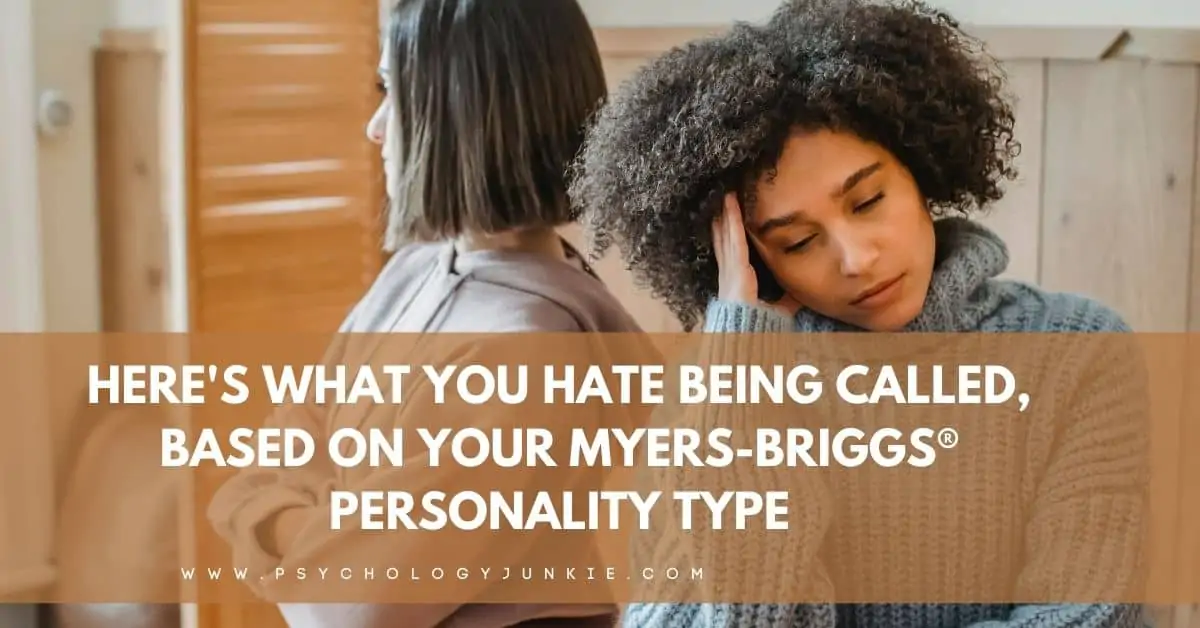






Thank you for this article! I’m an INFP and my grades were never great in school until I got to college where professors have more freedom in how they structure their classes than K-12 teachers do. In fact, I taught middle/high school for a bit and hated how structured I was expected to be. I’ve been a college professor for a few years and love the creative freedom. There is of course structure to my classes (due dates, expectations, etc) but I give students several options in how they complete some projects – traditional papers, podcasts, videos are just a few that I use. I try to be as flexible as I can based on how they learn best.
Usually I really like all the posts from Psychology Junkie but this series and even the question that some types might be smarter than others or that IQ has any relation to type is a stretch to say the least and because this is such a good site it may give many new individuals the wrong impression…..
As an educator for 32 years and now a consultant I have used the MBTI with thousands of students and educators however my background in Assessment allowed me to use type as one of many instruments and assessment devices……There is absolutely NO CORRELATION between IQ and any individual type nor is there any correlation between any one type and any learning disability. All types can be gifted, all types can have learning issues, all types can have attention concerns, all types might be autistic etc. Over my career I worked in 3 or 4 large ( over 2300 students) schools but my last school was in a building for gifted and talented students. Over 800 students from all over our city were transported to the gifted and talented program inorder to meet their unique needs. No one type of student attended that program. The criteria for the program was above the 96%ile on an IQ instrument (WISC) with other circumstances that related to an inability to meet the specific needs of the student in their home school…..( ie a grade 7 student doing first year college level math etc. etc. etc.)
Please be very, very careful using the concept of IQ and linking it to type…..there is so much misinformation and abuse of testing in general with our students that to even link type and IQ will feed into that arrogance and vast amount of misinformation that often seeps in. Please leave the link between IQ and type alone…..it feeds some very unpleasant stereotypes .
I appreciate your response, and I’m really excited to hear from someone who uses MBTI in an educational setting! The information about type and IQ actually came from the MBTI® Manual itself, page 269, where they discuss type and IQ and have a comparison graph of intelligence and grades of the 16 types in High School. I was trying to include as much information as possible, and since this was a series I was going to try to shine a light on the strengths and unique ways of thinking that each type brings to the table. This series is definitely not meant to feed into superiority of any kind, but I can see how the segment about IQ might prompt that. So I am going to change that section per your recommendation, and I appreciate you voicing your concerns with me. I definitely believe that there is no smarter type than any other type, but that each type has unique ways of seeing the world and applying information that make them special. That was the overall purpose of the article 🙂 I hope the intent wasn’t too hard to discern.
Susan, you had a perfect response to this comment!! Personally, I found this article to be extremely well written and highly accurate. Perhaps M. Sutherland is an SJ type and thus has a difficult time seeing that this article is far more than a “smarter than” comparison. But your response was so respectful and calm! Well done.
IQ differences between races and ethnicities must be traumatic for you then. How did you cope with the disproportionate amount of Asians in mathematics for instance? There’s only one Ethnos the human Ethnos I suspect.
Way off base, ace.
I really like this. Im generally and ENFP a and see myself in this quite well. Also, I’m teaching at the college level. I’m curious about how my personality comes out during teaching.
Fantastic!!! It totally fits for who I am… very nicely done, Susan.
Thank you Marcos!!
As an INFP with three close INFP, INTP, and ENFP friends AND an INFP brother, I read through this just nodding my head thinking “yep, that describes So-and-so.”
It bleeds into my methods of teaching as well. Depending on what it is I’m teaching, I usually tell them the result I’m looking for and let them figure out how to get there on their own (crash and burn is one of my personal favorite ways of learning). If I see them struggling, I give them more help but usually by asking them questions to guide them in the right direction, giving small hints, or saying, “This is how I do it but you might find a better way.” It makes me feel really uncomfortable teaching in a way that forces the students to do something only one way. And if there is only one right answer, I usually want them to prove that true on their own instead of me just telling them.
My ISTJ friend is the complete opposite though. She preferred the methods of teaching in highschool over college because, in her words, “Why am I paying you if you’re making me figure it out on my own anyway? I’m basically teaching myself.” In her mind, the whole reason for being in a class is to be told the answers. She’s not lazy either, that’s just how she learns. Unless it’s something she really cares about, then she enjoys discussing the different possibilities.
Can one be both ENTP and INTP (XNTP)?
Can one be both INTP and ENTP (XNTP)?
Technically, no. But these two types are more similar than most because they both share the same cognitive functions, just in a slightly different order. If you’re not sure which one you are, read up on Ne and Ti (Extraverted Intuition/Introverted Thinking) – Which of these processes is more natural to you and generates a “flow” state for you more easily? Also look at stress reactions: If you’re an ENTP you’d be more stressed by being structured, repetition, paying attention to nitty-gritty details. If you’re an INTP you’d be more stressed by exuding emotions or being in emotional atmospheres.
I’m definitely not sure. I relate to both so much! Lol
Also when I took the MBTI test (on the 16personalities website, not sure how reliable/accurate the results are) there was only a 1% or 2% difference in the Extraverted/Introverted trait. It was like 52% extraverted and 48% introverted or something like that.
Hi Susan,
I am delighted that my wife directed me to your site and repository of info on M-B traits et al.
In grad school I tested as an ENTP. Approximately fifteen years later, I tested as an ENFP. There was only a couple of points difference in the scoring. How rare is it to have essentially deadlocked scores? Is there a population stat for people on the cusp of these two types?
Thanks, Bob
Very well written and spot on article! Thank you x
As an INFP with a big (INTP) auxiliary identity (I am 60% F, 40% F, all other “categories” being much more steadily settled), let me congratulate you on this one.
I passed by this site years ago. And frankly, I immediately knew you were neither an INTP nor an INFP, by the way you wrote about us, and by the way you understood, and not understood, us.
Now it’s a few years later, and this has changed, and the content regarding INTPs, INFPs, and ENFPs (the three types you correctly credited with “post-conventional” thinking…) is both fine and fair.
I don’t know if you put “Random” twice in the INFP type as a stroke of irony, or it was an oversight on your part. But, anyway, see… we as humans tend to class as random what we don’t recognize a pattern in. So anything original, “self-directed” as you rightly say, and so on, will look random — least a lot of time is spent to know that person (which also takes good will and an open mind, together with time and trust). We aren’t random. We have our inner determining rules… basically, we look for truth (INTPs, ENTPs) and love (INFPs, ENFPs). Anything else will not really motivate us, unless it’s a matter of survival :)).
” For example, a Ne-user might see the moon and think to themselves, “what would happen if the moon exploded tomorrow?”.
Yes. We can also imagine that, unbeknownst to us human beholders, the sun and the moon chat, flirt, even!
We can imagine that, while appearing indifferent to us, they have their way to observe us, and feel saddened by all the lowly deeds we perform against each other and ourselves, while they are relieved by the occasional act of charity and courage, of self-respect and respect.
And this comes natural. The effort is needed to not think such thoughts, actually.
And, like all other types, we are inclined to project. Meaning… the first times we disclose such kind of thinking to others, we expect that they too “have” it, we expect that they’ll be happy to talk about it with us. Then we see them flee from us… and start wondering.
If there’s one thing we can hardly suffer, is to keep silent, but in our Ne-driven lives (even worse if Fi + Ne), we have to learn to keep silent. Because too often if we talk, what comes next is worse than keeping silent ;).
And if we are to talk “normally”, that’s insufferable too, it’s like having to follow a script, and being given a penalty for every deviation from it, whilst no-one else sees it’s a script, and a penalty & reward game, and not real talk.
It takes many many years, to learn to be at peace with all that, and all the rest. Art, serious songs, serious books, philosophies and religions, all those are lifesaves. Often, the only available.
“NP types are going to have an easier time remembering concepts and theories rather than facts and concrete data.”
Yes. Basically, the main cause for something to get established into our memory is, if it elicits important emotions, and also if it strikes us as peculiar.
A odd word, a word associated with a odd circumstance, anything of that sort, will stay in our memory.
Usually it will be infrequently met things, infrequently used words, and the likes.
Also, we memorise a lot of things that are beyond, or before, language. The exact hue of sunfalls we used to watch when on the car with our father, as teens, as we travelled back from a certain city. This kind of things.
Things that don’t have a name. They have a hue, a smell, a sound.
I also want to note that it is largely out of our control what we will remember, and what we won’t. Our will is of little consequence when it comes to that. Sometimes, even, the more I think I want to learn something by heart, the least it happens. When I stop consciously trying at it… then I start to memorise that thing.
Another thing is… if I want to write about something, and sit down to do it, well, that’s exactly when I’ll manage to think the least things to write. Then I give up, stand up, leave the room, start another activity which implies the practical impossibility for me to come back to my desk and write and… yay! Ideas start to flow, better-quality than ever. Even a while later when I am back at the desk, pen or keyboard in hand… I will never be able to find words as good, and natural, as they came before. It will be like a lukewarm translation of the original.
I have grown used to all of this… and have learned to accept it.
“This is why an NP student might handle creative writing very well, but might struggle if given a history test where they had to remember all the provinces in Canada (unless they had a personal interest in Canada).”
“Forcing an NP child to complete a project with very strict and rigid constraints and specifications takes all the fun out of it for them. It makes them feel like they’re not really learning; they’re just replicating something that has already been done a thousand times before.”
This is so me! Canada, by the way, happened to be interesting to me 🙂 But even with things I’m interested in: I like to learn with stories, with things that are connected to people. So I may know a bunch of history from a certain place, or facts, or things like that, but have very little idea what date things happened at at all! I only remember dates when they are connected with something I care about, so they’re definitely a weak spot for me in school. Basically, if something can capture my heart, I’ll remember it. If not, well… I might anyway, but mostly the way you ‘learn for the test’, probably not long term.
I do really well in school, and i am an INFP. Weird or not weird?
Not weird at all!! Thinking & Feeling preferences don’t indicate intelligence or lack thereof 🙂
The mbti content here is really good, but as an ENFP I wouldn’t be true to my type if I didn’t point out that the ads on this site are obtrusive and off-putting. I’ve been forced away from the article several times.
I’m sorry to hear that. I hate obtrusive ads. I have to have some ads going in order to pay hosting fees, etc,. but I don’t want them to be making it difficult to actually read the article. I’ll contact my ad agency to see if there’s anything that can be done, thanks for letting me know!